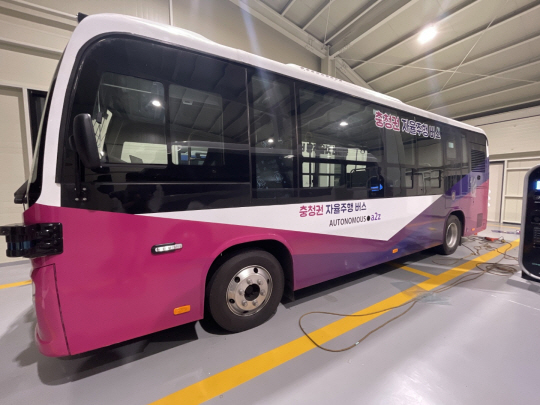Automobiles
Self-driving bus running on main roads launched for first time in S.Korea
They cover the bus rapid transit line between Osong Station and Sejong with a top speed of 80 kph
By Dec 27, 2022 (Gmt+09:00)
1
Min read
Most Read
LG Chem to sell water filter business to Glenwood PE for $692 million


KT&G eyes overseas M&A after rejecting activist fund's offer


Mirae Asset to be named Korea Post’s core real estate fund operator


StockX in merger talks with Naver’s online reseller Kream


Meritz backs half of ex-manager’s $210 mn hedge fund



South Korea in a first for the country has launched self-driving buses running on bus rapid transit (BRT) routes.
The Ministry of Land, Infrastructure and Transport on Tuesday announced the service of BRT-only self-driving buses on a 22.4-km section between Osong Station and Sejong Express Intercity Bus Terminal in Sejong, the nation's de facto administrative capital located 121 km south of Seoul.
Though self-driving cars have been operated in pilot zones such as the Sangam-dong neighborhood of Seoul and Jeju Island, this is the first time for a self-driving bus to run on main roads.
Level 2 requires driver intervention but Level 3 minimizes the use of a driver to only if an emergency occurs.
For safe operation, a driver and a safety officer assigned to each self-driving bus perform duties like assistance for passengers getting on and off, autonomous driving guidance and prompt response to emergencies.
The driver sits in the driver's seat and does not hold the steering wheel during normal driving, but does so to steer in emergency situations like sudden cutting in by another vehicle or detection of an obstacle. The safety officer from an auxiliary seat supervises the bus's self-driving system and passengers.
The self-driving buses are free to ride for anyone who makes a reservation through the quick response or QR code displayed on the websites of Sejong City Hall and Chungcheongbuk-do Province and posters at BRT stops.
The pilot operation of the vehicles will last for around three months, after which the ministry will have them charge standard city bus fare after considering the opinions of a civic experiential group who uses the buses.
The ministry said the self-driving buses will serve as the basis for the implementation of the Mobility Innovation Roadmap, which includes adoption of fully autonomous Level 4 buses and shuttles by 2025.
Write to Hun-Hyoung Ha at hhh@hankyung.com
More to Read
-
 AutomobilesSelf-driving startup 42dot unveils driverless shuttle
AutomobilesSelf-driving startup 42dot unveils driverless shuttleSep 26, 2022 (Gmt+09:00)
1 Min read -
 Future mobilityKakao Mobility, Hyundai to launch pilot robotaxi service by year-end
Future mobilityKakao Mobility, Hyundai to launch pilot robotaxi service by year-endSep 19, 2022 (Gmt+09:00)
1 Min read -
 Future mobilityHyundai Motor to buy Korean self-driving startup 42dot
Future mobilityHyundai Motor to buy Korean self-driving startup 42dotJul 29, 2022 (Gmt+09:00)
2 Min read -
 Future mobilityHyundai, Kia to launch Level 3 self-driving Genesis G90, EV9 in 2023
Future mobilityHyundai, Kia to launch Level 3 self-driving Genesis G90, EV9 in 2023Jul 15, 2022 (Gmt+09:00)
3 Min read
Comment 0
LOG IN


